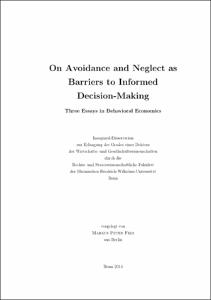On Avoidance and Neglect as Barriers to Informed Decision-MakingThree Essays in Behavioral Economics

On Avoidance and Neglect as Barriers to Informed Decision-Making
Three Essays in Behavioral Economics

| dc.contributor.advisor | Heidhues, Paul | |
| dc.contributor.author | Fels, Markus Peter | |
| dc.date.accessioned | 2020-04-19T14:48:01Z | |
| dc.date.available | 2020-04-19T14:48:01Z | |
| dc.date.issued | 07.08.2014 | |
| dc.identifier.uri | https://hdl.handle.net/20.500.11811/5955 | |
| dc.description.abstract | The thesis comprises three essays on the reasons for and consequences of poorly-informed decision-making. Chapter 1 investigates active avoidance of information as a source of uninformed decision-making. Next to providing input for subsequent decisions information may trigger undesirable emotional responses. An optimal decision on information acquisition then weighs benefits from better decision-making against the costs of an inferior emotional well-being. The model is applied to the context of medical testing. The availability of effective cure and the timing of testing are predicted to be significant determinants of test uptake. This is in line with empirical evidence on barriers to testing. Chapter 2 proposes a model of limited attention. Given limited cognitive capabilities a decision-maker may simply be unable to make a fully-informed decision. Thus, the resulting decision neglects some of the available information. The model is applied to investigate the question of optimal product design when customers have limited attention. It is shown that a firm can increase its profit by introducing goods that have the sole function of manipulating consumer attention. In addition, the chapter discusses how a firm can profitably employ such manipulating goods. Chapter 3 presents an analysis of how customers with limited attention value and choose among health plans. It shows how the model can accommodate four observations regarding plan choice.First, people tend to overweight the premium and thus underappreciate the value of health insurance. Second, insurance companies have a strong incentive to reduce quality and to hide the shortcomings in the fine print while attracting customers with insufficiently lower premiums. Third, customers may choose dominated alternatives. Finally, the willingness-to-pay for insurance is subadditive creating an incentive for providers to unbundle comprehensive plans. It is discussed how these effects may result in a fundamental dilemma for policy makers. | en |
| dc.language.iso | eng | |
| dc.rights | In Copyright | |
| dc.rights.uri | http://rightsstatements.org/vocab/InC/1.0/ | |
| dc.subject | Informationswert | |
| dc.subject | Informationsvermeidung | |
| dc.subject | Begrenzte Aufmerksamkeit | |
| dc.subject | Fokussierung | |
| dc.subject | Produktdesign | |
| dc.subject | Versicherungsnachfrage | |
| dc.subject | Krankenversicherung | |
| dc.subject | Value of Information | |
| dc.subject | Information Avoidance | |
| dc.subject | Limited Attention | |
| dc.subject | Focusing | |
| dc.subject | Product Design | |
| dc.subject | Insurance Demand | |
| dc.subject | Health Insurance | |
| dc.subject.ddc | 330 Wirtschaft | |
| dc.title | On Avoidance and Neglect as Barriers to Informed Decision-Making | |
| dc.title.alternative | Three Essays in Behavioral Economics | |
| dc.type | Dissertation oder Habilitation | |
| dc.publisher.name | Universitäts- und Landesbibliothek Bonn | |
| dc.publisher.location | Bonn | |
| dc.rights.accessRights | openAccess | |
| dc.identifier.urn | https://nbn-resolving.org/urn:nbn:de:hbz:5-37018 | |
| ulbbn.pubtype | Erstveröffentlichung | |
| ulbbnediss.affiliation.name | Rheinische Friedrich-Wilhelms-Universität Bonn | |
| ulbbnediss.affiliation.location | Bonn | |
| ulbbnediss.thesis.level | Dissertation | |
| ulbbnediss.dissID | 3701 | |
| ulbbnediss.date.accepted | 23.07.2014 | |
| ulbbnediss.institute | Rechts- und Staatswissenschaftliche Fakultät / Fachbereich Wirtschaftswissenschaften : Institut für Mikroökonomik | |
| ulbbnediss.fakultaet | Rechts- und Staatswissenschaftliche Fakultät | |
| dc.contributor.coReferee | Krähmer, Daniel |
Dateien zu dieser Ressource
Das Dokument erscheint in:
-
E-Dissertationen (288)




